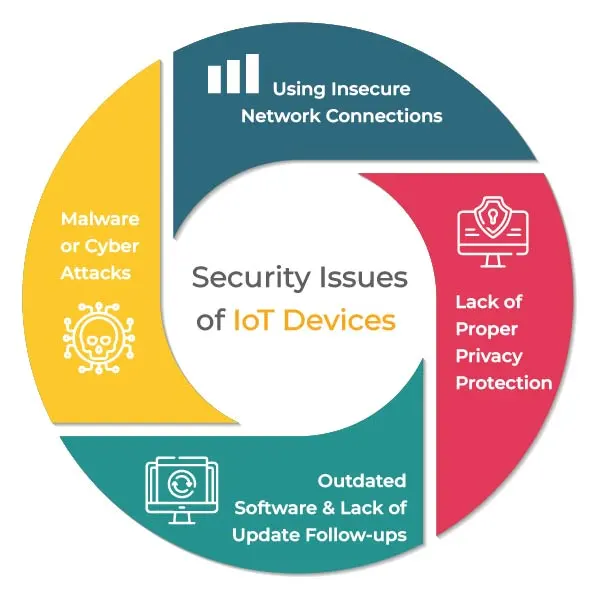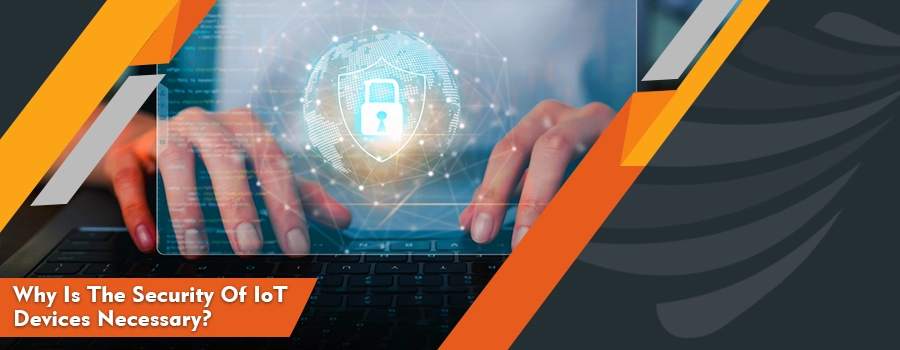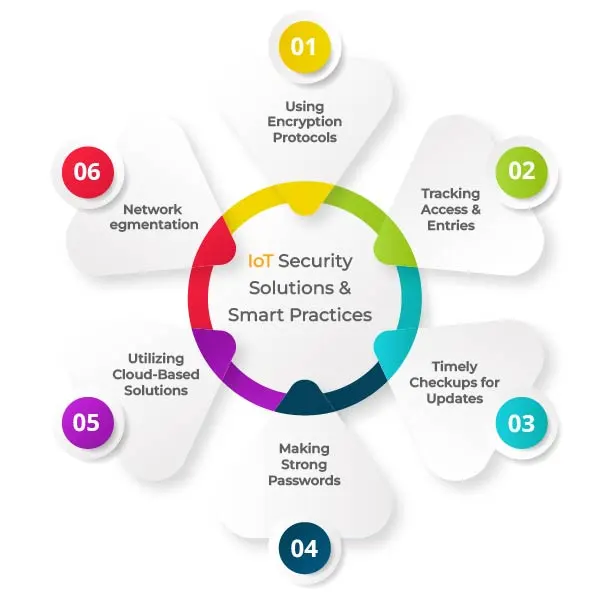The Internet of Things has made it possible for us to connect digitally and access or control different physical objects and devices via the Internet. IoT technology or solutions refer to all of the physical devices that share and collect data through the medium of the Internet. With rapid technological advancement, IoT devices have encircled us completely, impacting almost every sphere of our life. As per a report, the market of IoT devices is estimated to hit the mark of USD 1.3 trillion by 2026. Likewise, every industrial sector utilizes different IoT applications in one way or the other in order to make enhance its overall productivity.
Moreover, given the boom in IoT devices and solutions, a lot of things have become secure and quick, but we are facing an overflow of digital data. Likewise, inadequate protection of such data may cause a significant breach of our privacy hence acting as an Achilles heel of IoT innovations and technology.
What is IoT Security?
As the name suggests, it refers to the technology that focuses on securing and protecting IoT-powered connected devices, networks, and the data shared and collected. Generally, IoT devices lack an In-built computational security protocol, mainly due to a lack of investment and robust firmware. It is crucial that the data and network of IoT devices must remain highly secured, as a breach may lead to significant loss and leaked personalized information in the black market. That is why the security of IoT devices is necessary for safe and progressive use. Moreover, the measures taken for the security of IoT devices may include specific innovative techniques, actions, strategies, and protocols that are undertaken to mitigate all the shortcomings of IoT technology.

Security Issues of IoT Devices
Given the importance of security in IoT technology, below are some crucial IoT security issues that can have severe repercussions on devices’ performance.
• Using Insecure Network Connections
It is obvious to infer that hackers and exploiters usually access your IoT devices and the data when you use the public Internet. Utilizing such public network connections makes the security of IoT devices around you vulnerable to breach, capture, and leak of confidential information shared between servers and devices.
• Lack of Proper Privacy Protection
Another IoT security issue is the lack of proper privacy protection. Users sometimes create easy, familiar, and guessable passwords to keep things easy. However, this makes it effortless for hackers to jeopardize your privacy. Plus, it is usually a common practice that users also do not use a strong encryption mechanism that may compromise their sensitive data.
• Outdated Software & Lack of Update Follow-ups
Another factor that can make your IoT devices and their data vulnerable is using outdated or unauthorized software. This can invite a lot of unwanted cyberattacks against your devices. In addition, people also pay less heed to cyber security importance. By not following proper update schedules, their IoT devices may face severe challenges regarding data security concerns.
• Malware or Cyber Attacks
Another IoT security issue can be cyber-attacks through malware. Cybercriminals and hackers are seen to mainly use botnet malware to hijack and access the network of connected devices. This malware is automated in terms of attacking or accelerating an attack for maximum damage and impact. It may result in a server crash, the collapse of device performance, and theft & breach of confidential data. An attack on hundreds and millions of IoT devices can have catastrophic results like a leak of users’ or companies’ sensitive information online.
IoT Security Solutions & Smart Practices
Given the fear of data breaches and leaks, the cybersecurity importance has increased significantly. Below are certain vital IoT security solutions and intelligent practices which may deter different cyber attacks:
• Using Encryption Protocols
One of the essential IoT security solutions is that users should utilize encryption protocols while storing, sharing, and exchanging data via the Internet through IoT devices. In addition, for web traffic, HTTPS, transport layer security, DNS security extension, and other synonymous protocols and mechanism should be utilized to deter cyber attacks. Likewise, encryption protocols and methods can greatly secure devices connected with mobile apps and even protect data stored in USD drives from malware infection.
• Tracking Access and Entries
Next on the list of IoT security solutions is the smart practice of tracking access and activity that is taking place via IoT devices. This practice of monitoring entries on IoT networks can alert the users or companies to become aware of an unauthorized activity or access by an unknown entity. It helps them take countermeasures beforehand to secure the network from breaches or data leaks. Also, users or multiple enterprises can ensure the security of IoT devices by incorporating robust firewalls and intrusion detection/prevention systems (IDPs) to deter unauthorized entries or cyberattacks.
• Timely Checkups for Updates
Timely updates and using the latest software version can be significant blessings in terms of cybersecurity. Without well-times updates and suitable software or firmware, IoT devices become vulnerable to different kinds of cyber attacks. It could severely damage and disable the performance of the device. Furthermore, cybercriminals with such attacks can gain access to devices and may also breach and steal users’ private data. Hence, following a smart practice of timely checkups such as updates or an updated version of the software can vitally aid in protecting devices from known cyber threats and vulnerabilities.
• Making Strong Passwords
Like timely checkups for updates, another practice for cybersecurity from the users’ end can be creating strong passwords. Usually, users, for the sake of convenience and remembrance, make simple and guessable passwords for their logins and sign-ins to access devices, servers, and networks. However, this makes it easier to breach and gain unauthorized entry for hackers into the IoT network and your personal digital space. This is why it is pertinent for users to create a strong password, which may compose of an alphanumeric combination with case sensitivity. Creating strong passwords is great deterrence that can help avert many cyberattacks while protecting your IoT devices.
• Utilizing Cloud-Based Solutions
In recent times, cybersecurity importance has increased significantly. To mitigate the IoT security issues, users, companies, and industries have begun utilizing Cloud-based solutions for added protection. Cloud technology allows users to securely store their data in the digital cloud- a physical-less storage system. Moreover, this technology utilizes advanced security protocols and strict policies to maintain robust data security. This helps ensure the safety of IoT devices, networks, and data. IoT and cloud technology are becoming progressively integrated, leading to the development of secure IoT innovations, such as ParkSmart. This IoT innovation uses cloud technology to securely store data while facilitating hassle-free smart parking and digital payments.
• Network Segmentation
Another way to ensure security in IoT is by network segmentation. IoT devices that require to be linked with the Internet directly should be monitored for anomalies & errors. They should be segmented into their networks while having restricted access or entry to the main enterprise network. Upon encountering, any irregularity or suspicious activity, users can then easily isolate the possible infected IoT device without affecting other devices and networks in the chain. With the network segmentation strategy, users can minimize the possibility of cyberattacks and prevent any breach in their network while ensuring sound data protection.
To Conclude…
In a nutshell, the continuous technological advancement and development of smart devices have raised the bar of cyber security. And given the fact that the market of IoT solutions is increasing makes IoT a crucial part of the future. Hence, for progressive and safe usage, the security of IoT devices has to be ensured against different malware, cyberattacks, and hackers. This will help prevent significant losses, theft, and confidential information leak on the black market. However, with time, the nature and features of cyberattacks are evolving, making it evident for us to develop and adapt better and more innovative IoT security solutions respectively.






